Wyatt Russell talks Lake Hour and RTDs
By Rupert HohwielerActor Wyatt Russell and film producer Richard Peete gave us the intel behind their ready-to-drink (RTD) brand Lake Hour and its ‘unique’ flavour combinations.
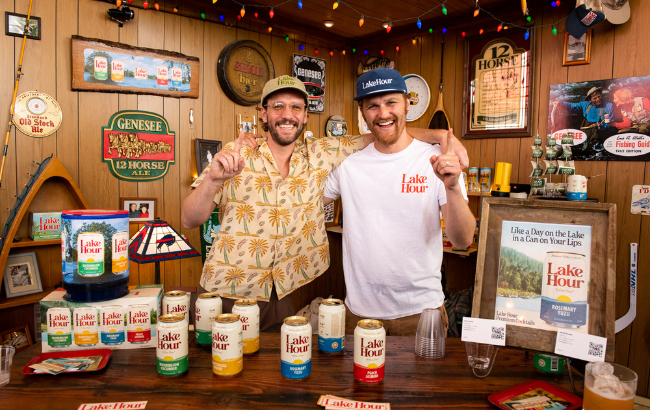
Lake Hour, a RTD brand co-founded by friends and ‘lake buds’ actor Wyatt Russell and producer Richard Peete, first launched two years ago in August 2023.
On the company’s website the pair say the idea for the brand came on a trip where they “realised that beers just don’t go down like they used to, so we decided to create the world’s most delicious, dad-bod-resistant cocktail in a can”.
They also wanted to create a brand that nods to their childhoods spent by lakes and one that’s also personal to them, more so than ‘standard impersonalised corporate marketing of most brands in the RTD category’ it was said in a press release when Lake Hour first launched.
As it goes, there’s a little more to the story, which Russell and Peete were willing to share with The Spirits Business.
Lake Hour initially debuted with three vodka-based seltzers and a Tequila-based seltzer, and in April this year, added four vodka iced teas to the line-up. The canned drinks are all low in calories – between 109-113 – sit at 5% ABV, and are made with pure sugar, rather than stevia or aspartame.
Peete says he and Russell are fans of bubbly seltzer drinks and their younger nieces and cousins were getting into a tea phase and so they tried out a bunch of different iced teas themselves.
“We’re like ‘oh it’d be great to have a ‘Lake Hour version’ of this’, which is just more refreshing, made of real ingredients and something with no carbonation.”
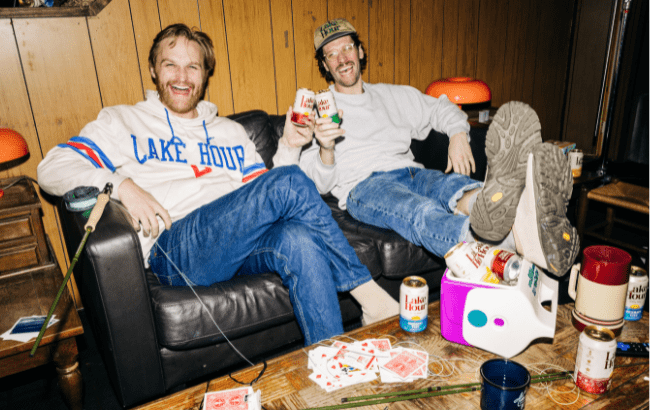
Bringing Lake Hour to life
Despite being a ‘celebrity’, Russell, who has come off a starring role in Marvel’s Thunderbolts and was filming for Avengers Doomsday when we spoke, is off social media and keeps a relatively low-profile in that sense.
“Having a booze brand is like a prerequisite to being a celebrity, and I’m not joking, you need an alcohol brand before you get signed by an agent,” he says, jokingly.
“I don’t have social media, though, so I don’t promote like other celebrities do with their brands. And many of them are not really part of the decision making of the company. It’s a bit like saying ‘fingers crossed and hope that this does well’.
“When we started this, it felt very family oriented. And part of it was like, look, I think that Rich and I can learn the business together, and have a real oversight of what’s going on and grow the right way by learning as we grow and helping each other that way. Being a part of the executive team in the beginning, and it just being us, it went so far, and goes so far when you know the founders are the ones calling the shots.
“At the beginning it was just Rich and I doing literally everything, calling supermarkets to calling buyers. I’d call the compliance people and they’ll be like ‘are you the actor’ and I’m like ‘yeah’ because we didn’t have anybody else on the team, it was just Rich and I.”
Peete adds that “it’s just trying to keep something that has a story and a brand behind it – it’s very personal to Wyatt and I.
“I’m a producer, Wyatt is an actor. We’re always serving somebody else’s vision, whether it’s a director or a studio, and this is just ours. He and I have designed or made final decisions on every flavour. We’re almost like annoyingly involved with each aspect of the company.”
Peete compares the company’s situation now to being an indie film where they’re a little bigger than the original short film stage, but one day the hope is that it’ll be the studio version with a big staff, doing hundreds of thousands of cases.
Currently, he says Lake Hour has sold around 30,000 cases.
Russell notes that their two-man style of raising a business became “insane” due to their work schedules and that they’ve grown the team a bit since.
“Every penny was looked at as precious, and that way, we also had a much better idea of what we were doing,” explains Russell. “It did become next to impossible, and Rich had to take over to like a hero status of doing everything. In the past six months, I’ve been working a ton in Australia and now London, and so I’ve sort of been a deadbeat in the past six months trying to keep up with everything.”
“There’s now four of us making decisions,” adds Peete.
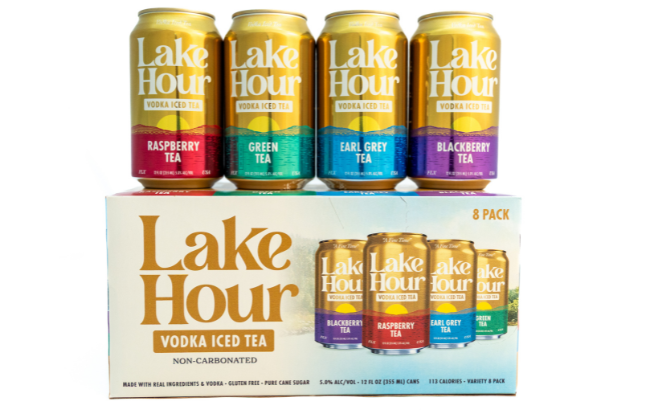
Inventive flavours
The decision to create vodka iced teas came last winter.
Peete says: “We were sort of just like okay let’s make some teas, we tried a couple and thought let’s do our version of it that is more refreshing, with some unique flavours. We have an earl grey-flavoured vodka iced tea, which I think nobody else has. We’re doing green tea, and then raspberry and blackberry as the others.
“We were able to design the cans, the boxes, develop the flavours, all within a couple of months and then go to market, which is fun because we do so much of that stuff in-house, and we don’t have a big board to report back to. And we do actually like them – that was the whole thing too.”
Regarding their choice of combinations, Peete and Russell weren’t afraid to deviate from the expected flavours (like lemonade), using their own tastebuds and those of their wives and family members to come up with what they thought would work.
“We’re not out there doing market research,” Peete says. “I think if we were to do market research on earl grey tea, for example, people probably would be like, get the f-ck out of here – but that’s actually the one that people are liking the most and then it’s also the one we like the most.
“We just played with flavour, sugar levels and different ingredients, until we got it to a place that we are excited about. I felt different. There’s got to be a reason for people to want it and we want to be trendsetters.
“So it’s just following our guts and then just knowing that if we can stick to this brand that we created, which is about lake life, leisure time and clean ingredients.”
“Our wives are the brains behind it, really, we’re just the faces. They’re the real scientists,” Pete adds, playing themselves down.
Russell meanwhile, credits his half-sister (fellow actor Kate Hudson, who is also in the alcohol business): “I did a tea taste test with my family, and my sister was honestly the one who was like ‘these are amazing’. We were just going to do one, but they were all so good, and she was one who was like ‘just do them all’.”
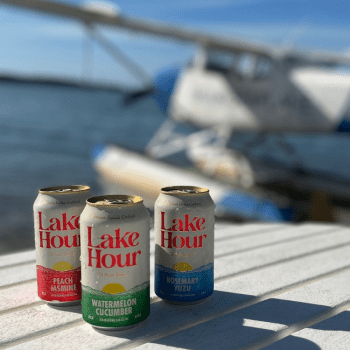
For the seltzers, the flavours combinations follow a similar unconventional theme with Watermelon Cucumber, Rosemary Yuzu, Peach Jasmine and Honeysuckle Ginger.
Peete says they want to have a core flavour, as with beer drinkers and how they have their brands and preferred flavours.
“[With] a lot of these seltzer and lemonade brands, there’s just so many flavours, and nobody’s picking a favourite. They’re like yeah, whatever you’ve got, pineapple, black cherry – it’s kind of all the same.”
Russell says Honeysuckle Ginger is “his jam” and also points out that while there may be a decline in interest for malt-based seltzers, spirits-based ones are still “on a rocket ship.”
He explains: “That was like the big question. In the beginning, what do we call ourselves? What are we? I think hard seltzer is just now the term for anything obviously with alcohol in it, but people are now running much faster to liquor-based partly because laws are getting better in the US.
“They’re changing it to a percentage by ABV. In some states like Pennsylvania, laws have changed where you can now sell liquor-based RTDs as long as [they] are below a certain percentage in grocery stores. Not just in the state-owned liquor stores. And so people are coming to them more now because, well, they taste better. Those still have a pretty great growth curve.”
Of the iced teas, which feel of the moment in RTDs in the US right now, he says “we didn’t just want to catch the wave or whatever, but you want to be part of the first wave and to not say two years’ down the line ‘well, let’s do an iced tea vodka’.
“You want to do it now.”
For the future, the pair are happy with what they currently have and the iced teas are still hot off the press, but there is a new flavour coming, and in a new format, as Peete shares.
“We weren’t going to do anymore, but there’s one flavour pairing that Wyatt is obsessed with that we had to do.
“They changed the laws in Pennsylvania (effective from 16 September 2024) and you can now do a 16-ounce can. Wyatt was going to quit the company if we didn’t do passionfruit tangerine,” he jokes (but also emphasises that Russell was very keen to do the flavour). “So we’ve developed that with Tequila.”
Down the road, Peete adds that they could experiment with THC and perhaps other things in the functional space.
“You know, other alternatives and maybe things that aren’t even in a can at this point – we’re having fun experimenting with what we can do.”
RTDs still a new category
Despite RTDs being a crowded category, they believe there’s plenty of wriggle room.
Peete explains: “People always say it’s a saturated market, but look at how many beers there are, or how many vodkas there are.
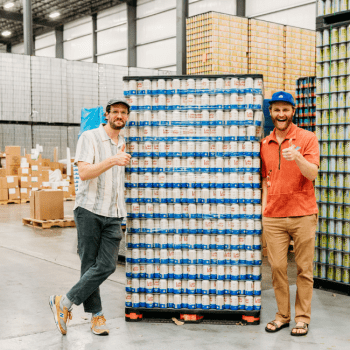
“When you talk about the big RTD brands out there now, it’s High Noon and Surfside, and then ones like Nütrl.
“I think there’s a lot of opportunity to get to 500,000 cases or even one million a year, and just kind of grow this on our own and be like another independent company, like Surfside, which is really thriving out there.”
Russell feels RTDs are still fresh.
“Its still a brand new category. Sometimes it’s hard to remember, especially in our day and age when everything is go, go, go and it’s all about riding the wave, but people forget High Noon basically didn’t start taking off till the pandemic. That’s five years ago. That’s no time, Budweiser has been around for 100 years.
“It takes time and energy and persistence and patience to build a company and build a brand that revolves around trust of your consumer and connection from your consumer, and so that in itself, is something we’ve approached where we want to build this brand.”
Building regionally
Lake Hour is currently available in eight states offline – New York, Minnesota, Pennsylvania, Wisconsin, Georgia, New Jersey, Oklahoma and Florida – and then nationwide online.
Peete says the brand is also in sports arenas like KeyArena in New York and they’re working on the Buffalo Bill stadium, with both of them being big sports fans. “Wyatt was a professional hockey player. I could have gone pro, but decided not to.”
Russell notes, however, that they’re also hoping to partner with local teams and venues.
“We’re looking at partnering with the right people where you can put your stake in the ground and do more than just sell in the arena. It doesn’t always have to be the Dallas Cowboys. It can be something, you know, more regional and local.
There’s no major huge rush to be everywhere and anywhere, Lake Hour is centred around leisure and relaxation after all – the aim is the build a real brand first and the community that comes with that.
“You can build these things regionally,” Russell continues. “There’s different ways of going about it, but winning regionally, winning in your areas of focus is really important – so it’s not ‘we’re gonna go national’ and then you didn’t really have a plan or have a base, and so having a home in these places that identify the brand, support the brand, push the brand. Those are really important things. We are trying to create more of those relationships.”
Envisioning Lake Hour down the line, Russell touches on the brand’s nostalgia aspect.
“Lake Hour expands on so many other thoughts, ideas and visceral parts of people’s lives – when they go to the lake, or go to a body of water and you get that feeling of what it was like to be in your granddad’s basement or what it was like to have your first Lake Hour.
“If you had your first Lake Hour in the US aged 21, seven or eight years later, when you’re entering true adulthood, and some people are becoming parents, it becomes part of the nostalgia of what you enjoyed in your twenties.
“It doesn’t necessarily always happen overnight, you need to have that solid base of a foundation to grow from, so it isn’t just a flash in the pan.”
Related news
World Spirits Report 2025: RTDs
